OWENS NEVER SAID AIYANA JONES’ DAD GAVE HIM GUN USED IN TEEN’S KILLING
-
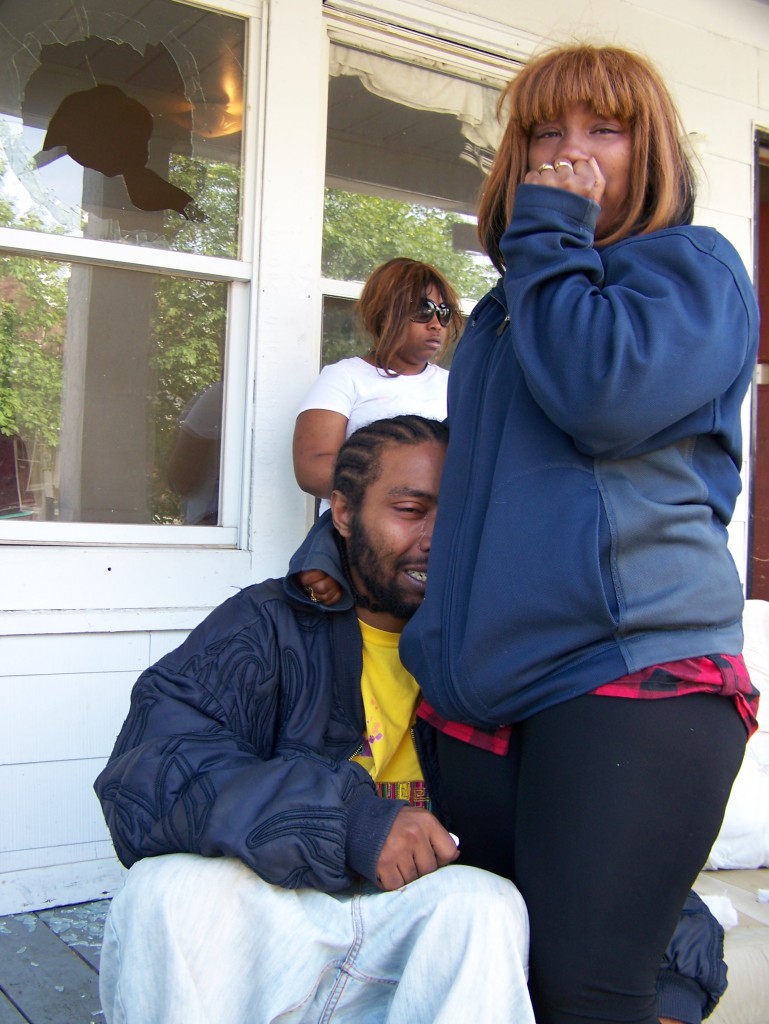
-
Aiyana Jones’ father Charles Jones and Dominique Simpson grieve in front of window shattered by cop grenade, the morning of her murder
Is deal part of cover-up of cop murder of 7-year-old child?
By Diane Bukowski/Detroit Voice
May 20, 2011
Detroit–On April 11, headlines in Detroit’s daily media trumpeted, “Guilty plea fingers Aiyana Stanley-Jones’ dad” (Detroit Free Press) and “Suspect promises to testify against Aiyana’s father” (Detroit News). Mildred Gaddis and other local talk show hosts hurried to their mikes to blame Aiyana’s family for the death of the seven-year-old child, killed by Detroit police last year during a military-style police assault.
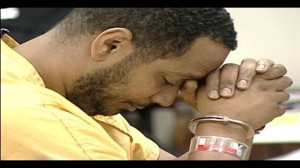
Chauncey Owens during earlier court hearing
Chauncey Owens, 32, pled guilty that day to second-degree murder in the death of Je’Rean Blake, 17. Police had said they were searching for Owens when they lobbed an incendiary grenade through the living room window of Aiyana’s home in an impoverished east side neighborhood, and shot her to death on May 16, 2010.
The Jones’ family’s attorney Geoffrey Fieger said during a press conference after her death that police surveilling the house saw Owens leave the premises about 6 p.m. May 15, and could have arrested him then. Fieger contends in a lawsuit that police deliberately waited to set up a scene for the A&E program “48 Hours” before entering the home at 12:30 a.m. May 16.
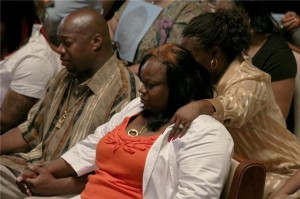
Chauncey Nobles and Lyvonne Cargill, parents of 17-year-old Je'Rean Blake, at his funeral
“There are a lot of young people out there getting killed,” Je’Rean’s mother Lyvonne Cargill told this reporter on July 6 that year. “Both Je’Rean and Aiyana are up there in heaven looking down and asking, ‘Why did this happen?’ We gotta help our kids. They want jobs. They don’t have any recreation centers, nothing to do with their lives. I want to get a foundation set up to build a recreation center in Je’Rean’s name.”
Cargill was being interviewed about a police assault that occurred during a memorial picnic on Je’Rean’s June 17 birthday. She said white officers beat and shot at Black youths who were cleaning up afterwards (click on http://michigancitizen.com/mother-of-slain-teen-claims-police-brutality-p8783-1.htm to read story).
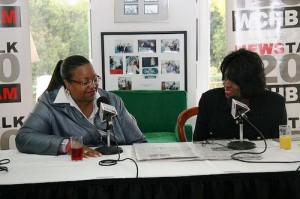
Wayne County Prosecutor Kym Worthy being interviewed by Mildred Gaddis
But on April 11, Gaddis and others featured Cargill on their shows, encouraging her to join in the media-generated hysteria blaming Charles Jones for the death of his child, and essentially exonerating the police.
There is, however, absolutely no documentation indicating that Owens or anyone else said Charles Jones gave him the gun that killed Blake. NONE.
It does not exist in Owens’ written plea deal, in statements he gave the police, or in interviews court-appointed psychiatrists conducted with him, which VOD reviewed in Owens’ court file. No witnesses included on a police investigator’s list in the file make the claim either.
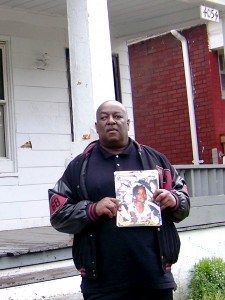
Roland Lawrence in front of Jones' family's former residence at 4054 Lillibridge, on the first anniversary of Aiyana's death May 16, 2011
“The police and the prosecutor (and others) will go to any length to get rid of the Aiyana Jones story including but not limited to creating fictitious stories and associations,” said Roland Lawrence, chair of the city’s Justice for Aiyana Jones Committees.
“Unless these entities come out and explain to the public what is really going on, there will be a parade of stories created about them and why they are sitting on the investigation into Aiyana’s death. Were Worthy, Evans, Bing and others so intimately involved in arranging for the Hollywood film crews to trample through Aiyana’s poverty-stricken neighborhood that they are working overtime to quash the investigation because they do not want to be implicated? Were there 36th District Court judges involved as it pertains to the signing of arrest warrants? Were the Detroit and Michigan Film Offices involved in arranging for film permits? The community should conduct their own investigation, and let the can of worms come running out.”
On May 20, Wayne County Circuit Court Judge Richard Skutt postponed Owens’ sentencing from May 23 to July 29, reportedly because complications have arisen regarding the terms of the plea bargain.
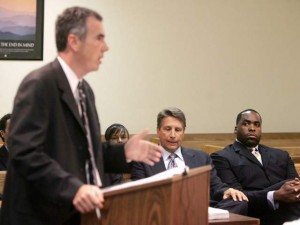
Asst. Prosecutor Robert Moran speaking during court hearing on former Mayor Kwame Kilpatrick's text messages
“Defendant must testify truthfully about who supplied him with the gun to shoot the victim,” Assistant Prosecutor Robert Moran said in the plea document in Owens’ file. “If defendant cooperates and testifies truthfully, then we will ask the sentencing judge to reduce the sentence by two years. He must testify at all hearings requested and must submit to polygraph exams.”
According to his court file, Owens’ statements to police were obtained soon after the police assault on Aiyana’s home, but only after he repeatedly denied any involvement in Blake’s death, and after he discovered Aiyana had died. His attorneys Pamela Szydlak and later David Cripps filed and argued motions to suppress the statements, which Skutt denied.
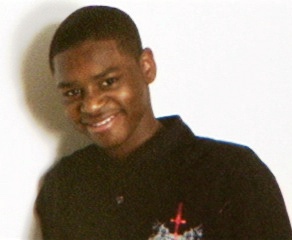
Je'Rean Blake
In the contested statements, Owens says Charles Jones was with him in a group that went to the store at St. Jean and Mack where Je’Rean was shot to death. However, he names another individual as the one who gave him the gun.
He said he first went to the store with his brother, known as “Chinaman,” and a friend, but his brother could not get into the store to buy a beer because a group of young people outside the store “were talking s—.”
Two witnesses who testified at Owens’ preliminary exam, who knew neither Owens nor Blake, said there were approximately 40 people in the crowd. They said Owens and Blake had a verbal confrontation. Owens said he then drove down Lillibridge on his moped, encountered the group including Charles Jones, and asked them to go to the store with him to “whup some ass.”
Owens said they did so.
Asked whether Charles Jones knew what was going to happen, he said only, “He knew the gun was there.” He said the group had a gun for self-defense because one was wearing diamond Cartier glasses, and the the person who gave him the gun told him to take it for self-defense because “there are a lot of n—-s out there.” He said he fired the gun accidentally.
The preliminary exam witnesses identified Owens as the shooter. On cross-examination, Szydlak obtained an admission from one that he did not pick him out of a photo display immediately after the shooting.
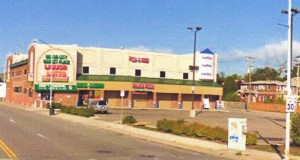
Mike's Motor City Marketplace on St. Jean and Mack, site of Je'Rean Blake's murder
Also in testimony at the exam, Cargill said she drove to the store to pick up her son after he called her. When she got there, her son’s friends were about to put him in their car to take him to the hospital, but Cargill drove him herself. It is unclear why police or 911 had not responded to the scene, either after the shooting, or because of the gathering of such a large crowd before the shooting.
On a website called the National Speed Trap Exchange, a man reported on May 13, 2010:
“On Mack Avenue between St.Jean and Conner is a railroad bridge. Detroit police in the white traffic cop cars catch speeders coming Westbound on Mack. They sit in the party store parking lot across St.Jean with the laser gun pointed up the bridge and catch speeders coming down the hill.The speed limit on Mack is 30MPH. Usually they are out on the weekends doing this as I have seen them doing it on Sundays.”
Je’Rean was killed at that store on Friday, May 14, 2010. Where were the police then?
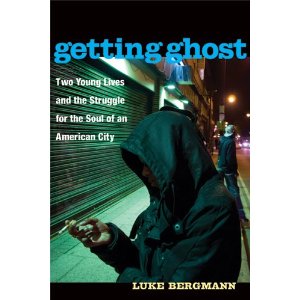
Getting Ghost tells of battle to stop Lou Nafso's liquor store at St. Jean and Mack from opening
In 2008, author Luke Bergman published a book, “Getting Ghost: Two Young Lives and the Struggle for the Soul of an American City.” Beginning on p. 61, it details the struggle of Mack Alive, community members and former Councilwoman Alberta Tinsley-Talabi to stop the opening of Lou Nafso’s “Mike’s Motor City Marketplace,” the store where JeRean Blake was killed.
To read an excerpt from the book (p. 61–”Boot dancing with Nafso,” detailing the battle to stop the store’s opening, click on:
http://books.google.com/books?id=rt S8Xe1S_wC&pg=PA60&lpg=PA60&dq=Motor+City+liquor+store+St.+Jean+and+Mack&source=bl&ots=AEwNpuXzeJ&sig=3-T9v8PPAhhzIM16MgLqO rAqRQ&hl=en&ei=3UvaTantFoyatwf25LToDg&sa=X&oi=book_result&ct=result&resnum=1&sqi=2&ved=0CBYQ6AEwAA#v=onepage&q&f=false
A quote from the book: “According to their detractors, on the East Side, such merchants sell liquor with impunity to vulnaerable African-Americans in Detroit neighborhoods; they are drug dealers with licenses to do their business–selling ‘liquid crack,’ as one Mack Alive supporter suggested. Moreover. as on on the corner of Mack and Beniteau [where Nafso owns a beer and wine store), such outlets are seen as magnets for other so-called disorderly behavior, including prostitution and street drug-dealing. Indeed, gatherings of Black young men leaning against liquor store walls are archetypal symbols of such markets."
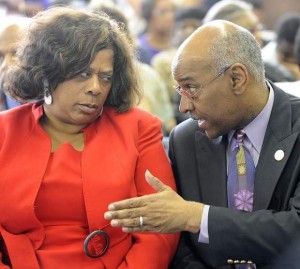
Alberta Tinsley-Talabi with Kilpatrick appointee Charles Beckham; despite her opposition, the City Council approved liquor license for Mike's Motor City Marketplace
The book, published by the University of Michigan press, also details the devastating effect that such stores, primarly owned by Chaldeans and Arab-Americans who do not live in Detroit and do not have such outlets in their own neighorhodds, have on the impoverished population of Detroit.
In response to defense motions for determination of Owens’ ability to be criminally responsible, waive his Miranda Rights and stand trial, Skutt appointed two psychiatrists from the Center for Forensic Psychiatry to interview him.
Skutt eventually declared Owens fit on all counts, based on the psychiatrists’ reports and on his viewing of a police videotape of Owens giving his second statement.
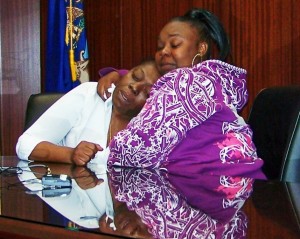
LaKrystal Sanders consoles her mother Mertilla Jones at press conference on the death of their niece and granddaughter Aiyana Jones
But the interviews, summarized by the psychiatrists in detailed letters, are nonetheless enlightening. They raise questions regarding Owens’ mental condition, both at the time he was interrogated by police, and throughout his life, as well as police tactics used in obtaining his statements.
In one interview, Owens described the night of the police assault, saying he was in bed with his fiancée LaKrystal Sanders, Aiyana’s aunt, when the incident began. Sanders lived in the flat above the home where Charles Jones, his mother Mertilla Jones, Aiyana and several other children lived. The homes had separate entrances.
“We heard a shot, we jumped up, my fiancée went downstairs,” Owens said. “My oldest daughter who is 15 came upstairs because she was scared. I told her to get dressed. I had my boxer shorts on. I came down and the police started screaming at me and handcuffed me.”
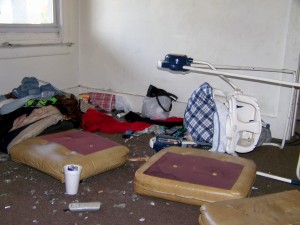
Interior of Jones' home after Aiyana was killed; couch cushions on which she was sleeping are on floor, after family moved couch outside to porch
Owens told the psychiatrist the police took him into the Jones’ flat, and sat him down on the couch where Aiyana died.
“Blood was on me and pieces of brain were all over the couch,” he said. Later after he was taken to the police station, he said the police would not give him his clothes, only a paper gown.
“I was freezing,” Owens said. “They put a shower cap on my head and laughed at me.”

Police investigator Theophilus Williams looks at statement signed by Chauncey Owens during preliminary exam in front of Judge Willie Lipscomb, Jr.
According to the psychiatrists’ accounts, as well as accounts of the videotaped statement in the court file, Owens denied any involvement in the Blake killing for over one and a half hours. He kept asking to call his fiancée. One officer told him he would let him call her if he gave him the testimony he wanted. Owens finally agreed, and was allowed to call Sanders.
“The detective wanted to use the phone call he gave him to get him to confess,” the psychiatrist wrote. Szydlak said in her motion to suppress the statement that police knew Sanders would tell him Aiyana was dead, and that he would be “overcome with anguish and grief.”
Sanders did so. Owens began weeping, then composed himself and gave the police the statement on record..

Defense Attorney Pamela Szydlak and Chauncey Owens at preliminary exam
In statements, Owens said he confessed to cover up his brother’s role in the shooting, but the police told him that he would not want to testify against his brother. They also told him, as Szydlak said in her motion, “that his family had suffered enough and he should agree with the interrogator for the sake of his family.”
Owens also told the psychiatrists he had been raised by his grandparents, and that his mother died of cirrhosis of the liver in 2008, after he had cared for her during her declining years. He said an uncle had abused him. He reported that he had “auditory hallucinations” from the age of 13 until the age of 30, and also reported paranoid delusions. He said he had been in special education classes since fourth grade, left school in the seventh grade and could barely read and write. He said the other students made fun of him.
The psychiatrists said those reports did not show Owens was mentally incompetent or unable to waive his Miranda Rights, as he did by signing a statement that the police had him read. They also asked him to read his confession out loud, written out by the police officer. The record shows he started to do, then stopped and just signed it.
One psychiatrist concluded, “It is the examiner’s opinion that available information raises the possibility that Mr. Owens functions below average intellectually, and the reader may wish to consider whether below average intellectual functioning might have impaired his ability to understand that the police meant to use the statements against him and that he was free to stop the questioning and request an attorney.”
That psychiatrist also said that Owens told him he was not sure if he could be tried without an attorney.
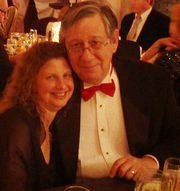
Judge Richard Skutt (Facebook photo)
Owens’ plea bargain was reached April 11 as he was about to go to trial. A jury had already been impaneled. Assistant Prosecutor Maria Miller, communications director for Wayne County Prosecutor Kym Worthy, issued the following statement regarding the plea bargain.
“Today Owens entered a guilty plea before Judge Richard Skutt to Second Degree Murder which carries a penalty of Life or any term of years. He received a sentence agreement of 28 years in prison. He also pleaded guilty to Felon in Possession of a Firearm (5 years) and Felony Firearm (2 years mandatory consecutive). As part of the sentence agreement Owens is required to testify truthfully in any future proceeding about who supplied him with the murder weapon. After Owens testifies the prosecution can appear before the court to request a sentence reduction on the Second Degree Murder charge to a sentence of 26 years. He is expected to be sentenced on May 23, 2011.
“We are very pleased that Owens has admitted his responsibility for the senseless killing of Jerean Blake and that he has agreed to cooperate with our investigation,” said Prosecutor Worthy in the statement.
VOD requested answers to the following questions from Asst. Prosecutor Miller regarding the postponement of Owens’ sentencing:
1) What are the reasons for the delay in Chauncey Owens’ sentencing?
2) Is the prosecutor’s office delaying the sentencing of Chauncey Owens because of the conflicting statements?
3) Is it the aim of the prosecutor’s office to charge Charles Jones in the Je’Rean Blake killing to divert attention away from the police killing of his daughter Aiyana Jones?
4) Although Judge Skutt denied defense motions to suppress Owens’ statements to police, does the prosecutor’s office support the following tactics:
· Waiting to arrest suspect until a spectacular scene could be set up for a reality TV show?
· Seating suspect on couch where Aiyana Jones died, covered with her blood and bits of brains, after his arrest?
· Interrogating him while he was dressed in his boxer shorts and a paper gown, and complained of freezing?
· Police putting shower cap on his head and laughing at him?
· Enticing him to confess with promises that he could call his fiancee if he went along with the interrogators’ version of events in his statements?
· Telling him to confess to save his family further grief?
5) Again, WHY have no charges yet been brought against the police in the death of Aiyana Jones? Your earlier statement regarding the length of time the prosecutor’s investigation is taking belies the fact that Prosecutor Worthy turned over the investigation immediately to the Michigan State Police to avoid the appearance of a conflict of interest. WHY would she now have to conduct her own investigation? Couldn’t this be considered obstruction of justice?

Pros. Kym Worthy at school board meeting Oct. 2010
Miller responded, “The Owens sentencing was adjourned at the request of the prosecution because the investigation in the homicide of Je’Rean Blake is ongoing. This is the reason that was placed on the record in court on May 20, 2011. We will not be able to answer your other questions as investigations are ongoing in the Blake matter and also regarding the death of Aiyana Jones.”
